1788

The New Jersey legislature elected the state’s first United States senators, Jonathan Elmer and William Paterson. Elmer, born in Cedarville but later of Bridgeton, was a physician who had entered politics and, at the time of his election to the Senate, was serving as Cumberland county surrogate. Paterson, born in County Antrim, Ireland, had attended the Constitutional Convention and was a practicing attorney in Brunswick.
1789
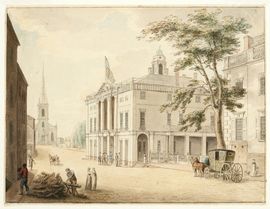
William Paterson appeared at Federal Hall in New York City and took his seat in the U.S. Senate. The Senate had convened for the first time on March 4, but because only eight senators were present, there were not enough to constitute a quorum. The body was forced to adjourn each day until April 6, when it achieved its first quorum of 12 members, out of the eligible 22.
1789
The senators drew lots to determine the three classes of senators. Jonathan Elmer was assigned the Class 1 seat (with a two-year term to expire in 1791) while Paterson was assigned to the Class 2 seat (with a four-year term to expire in 1793).
1789
Vice President John Adams administered the oath to support the Constitution to all senators present, including William Paterson. The statute regulating the taking of an oath, mandated by Article VI of the Constitution, was enacted on June 1, 1789. Jonathan Elmer took his oath on June 22.
1789
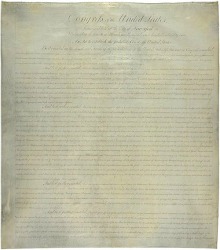
The Senate held its first recorded roll-call vote and passed a bill entitled "An Act to establish the Judicial Courts of the United States." New Jersey’s William Paterson was one of the principal members of the committee that crafted the bill, which was enacted on September 24, 1789.
1790
William Paterson resigned his Senate seat, having been elected governor of New Jersey on October 29.
1793

Frederick Frelinghuysen began his Senate service, becoming the first of four generations of Frelinghuysens to serve in that body. Frederick's son, Theodore Frelinghuysen of Newark, was a senator in 1829. His grandson, Frederick Theodore Frelinghuysen, also of Newark, was a Class 1 senator in 1866 and a Class 2 senator in 1871. Frederick’s great grandson, Joseph Sherman Frelinghuysen of Raritan, was a senator in 1917.
1796

Richard Stockton was elected to complete a vacant term and took his seat on December 6, 1796. He was the first of three Stocktons to serve in the Senate. His son, Robert Field Stockton of Princeton, was a senator in 1851 and his grandson, John Potter Stockton of Trenton, was a senator in 1865 and again in 1869. Richard Stockton's nephew, Richard Stockton Field of Princeton, also served in the Senate, in 1862.
1820

Senator Mahlon Dickerson, born in Hanover but later of Succasunna, became chairman of the Committee on Commerce and Manufactures (now the Committee on Commerce, Science, and Transportation), serving until 1825.
1828

The Senate resolved the contested election of Ephraim Bateman of Cedarville, in Bateman’s favor.
1828
Senator Ephraim Bateman became chairman of the Committee on Agriculture (now the Committee on Agriculture, Nutrition, and Forestry), serving until his resignation on January 12, 1829.
1829
Senator Mahlon Dickerson resigned his Class 2 seat and immediately was elected to the vacant Class 1 seat and served until March 3, 1833.
1838

Senator Garret Dorset Wall of Burlington became chairman of the Committee on the Judiciary, serving until 1841. He was the father of future senator James Walter Wall, also of Burlington, who was elected to a vacancy in 1863 and served for just a month and a half.
1842
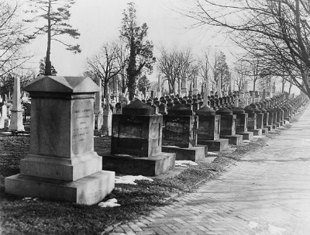
A funeral service for Senator Samuel Southard was held in the Senate Chamber, after which he was buried next to two of his children in Congressional Cemetery.
1844
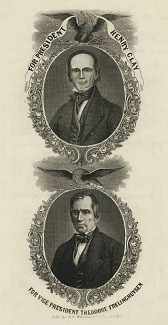
Former senator Theodore Frelinghuysen was nominated by the Whig Party for vice president of the United States, on the ticket with presidential nominee Henry Clay. They lost in the general election to Democrats James K. Polk and George Dallas (also a former senator).
1856
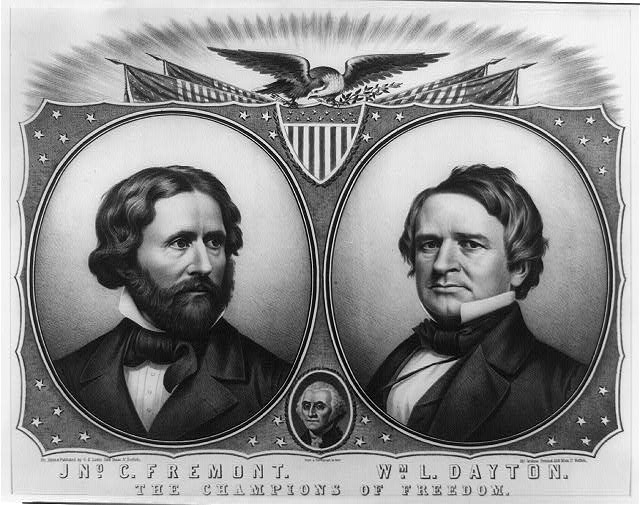
Former senator William L. Dayton was nominated by the fledgling Republican Party for vice president of the United States on the ticket with presidential nominee John C. Frémont. They lost in the general election to Democrats James Buchanan and John Breckinridge.
1871

Senator Frederick Theodore Frelinghuysen became chairman of the Committee on Agriculture (now the Committee on Agriculture, Nutrition, and Forestry), serving until 1877.
1879

Senator Theodore Fitz Randolph, born in Mansfield, Pennsylvania, but later of Morristown, became chairman of the Committee on Military Affairs (now the Committee on Armed Services), serving until 1881.
1888
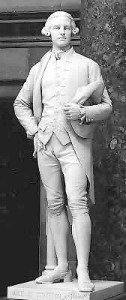
The Senate moved to accept a bronze statue of New Jersey Civil War general Philip Kearny by Henry Kirke Brown and a marble statue of Senator Richard Stockton (1764‑1828), begun by Henry Kirke Brown and completed by his adopted son, Henry Kirke Bush‑Brown, as New Jersey's contributions to the National Statuary Hall Collection.
1896

Senator William Joyce Sewell born in Castlebar, Ireland, but later of Camden, received the Congressional Medal of Honor for actions during the Civil War.
1897
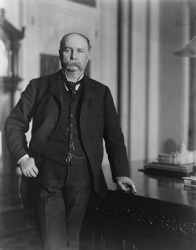
Born in Long Branch, New Jersey, Garret Augustus Hobart took office as the 24th vice president of the United States. As president of the Senate after the Spanish‑American War, Hobart cast a tie‑breaking vote in 1899 that kept the Philippines as a U.S. Territory. The Philippines remained a U.S. territory until 1946.
1901
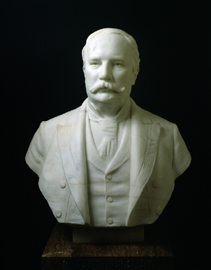
A marble bust of Vice President Garret A. Hobart (1844–1899), carved by Frank Edwin Elwell, was accepted by the Joint Committee on the Library for addition to the Senate's Vice Presidential Bust Collection.
1916
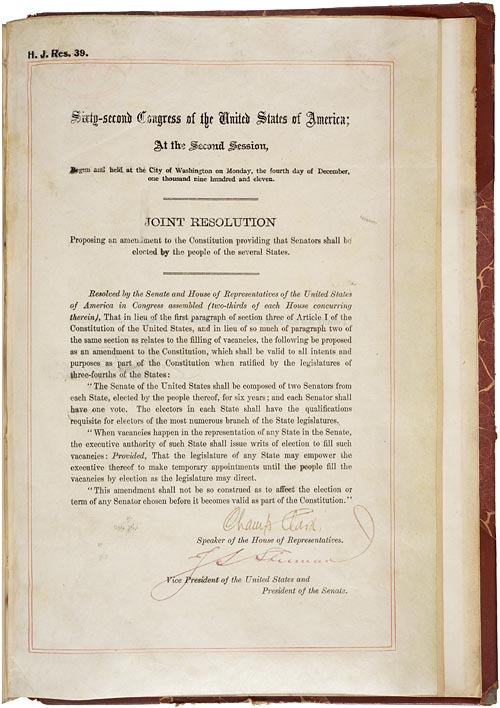
Following the adoption of the Seventeenth Amendment to the Constitution in 1913 providing for the direct election of senators, Joseph Sherman Frelinghuysen became New Jersey's first popularly elected senator.
1919

Senator Joseph Sherman Frelinghuysen read George Washington's Farewell Address, a Senate tradition dating to 1862.
1945
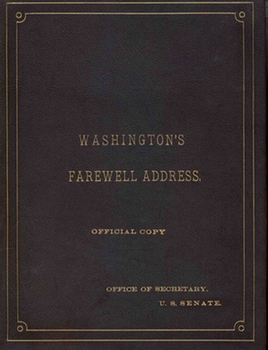
Senator Howard Alexander Smith, born in New York City but later of Princeton, read George Washington's Farewell Address, a Senate tradition dating to 1862.
1953

Senator Howard A. Smith became chairman of the Committee on Labor and Public Welfare (now the Committee on Heath, Education, Labor, and Pensions), serving until 1955.
1955

Clifford Philip Case, born in Franklin Park but later of Rahway, began the first of his 24 years in the Senate. New Jersey's second longest-serving U.S. senator, Case was reelected three times before his defeat in the 1978 Republican Party primary.
1971

Senator Harrison Arlington Williams, Jr., of Westfield and Bedminster, became chairman of the Committee on Labor and Public Welfare (presently the Committee on Health, Education, Labor, and Pensions), serving until 1977. Williams then continued as chair of the committee in its subsequent incarnations: the Committee on Human Resources, 1977 to 1979, and the Committee on Labor and Human Resources, 1979 to 1981.
1979

Rhodes Scholarship recipient William Warren (Bill) Bradley, born in Crystal City, Missouri, but later of Denville, began his first term in the Senate. A member of the 1964 gold medal Olympic basketball team and the NBA Hall of Fame, Bradley was elected to the Senate with no prior elective experience.
1980
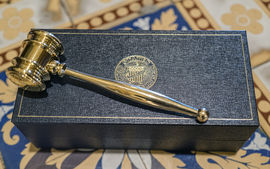
Senator Bill Bradley received the Golden Gavel Award for presiding over the Senate for at least 100 hours in one session. He received the award a second time in 1987.
1981
Senator Harrison Williams was convicted of charges resulting from the FBI sting operation known as “ABSCAM” and served 21 months in prison. During subsequent Senate proceedings on an expulsion motion, Williams resigned his seat on March 11, 1982.
1984

Senator Frank Raleigh Lautenberg of Montclair, Secaucus, and Cliffside Park, read George Washington's Farewell Address, a Senate tradition dating to 1862.
1998

Senate Democrats elected Robert Guy Torricelli chairman of the Democratic Senatorial Campaign Committee, a position he held until 2001.
2000
Former senator Bill Bradley campaigned unsuccessfully for the Democratic presidential nomination, losing to Vice President Albert Gore, Jr., of Tennessee. Gore went on to lose the election to Texas governor George W. Bush.
2002

Jon Corzine, born in Taylorville, Illinois, but later of Summit and Hoboken, read George Washington's Farewell Address, a Senate tradition dating to 1862. Elected to the term ending in 2007, Corzine resigned on January 17, 2006, having been elected governor. Corzine received a Golden Gavel Award in 2002 for presiding over the Senate for 100 hours in a single session.
2002
The Senate Select Committee on Ethics issued a letter to Senator Robert Guy Torricelli severely admonishing him for accepting gifts from a political donor who was later convicted of illegally funneling money to the senator's campaign. The committee accused Torricelli of violating Senate ethics rules on three occasions, but it stopped short of asking the full Senate to censure or expel him. Torricelli withdrew from his reelection campaign in September 2002.
2002
Senate Democrats elected Jon Corzine chairman of the Democratic Senatorial Campaign Committee, a position he held until 2005.
2007

Robert Menendez, born in New York City but later of Union City, received a Golden Gavel Award for presiding at least 100 hours in one Senate session.
2008
Senator Robert Menendez was elected chairman of the Democratic Senatorial Campaign Committee, a position he held until 2011.
2008

Senator Frank Lautenberg became New Jersey's longest-serving senator, surpassing Clifford Case's 24 year tenure. Lautenberg was first elected to the Senate in 1982. He chose not to run for reelection in 2000 but returned to the Senate in 2003. He died on June 3, 2013, having served for 28 years, 5 months, and 8 days.
2013

Senator Robert Menendez became chairman of the Committee on Foreign Relations, a position he held until 2015, and again beginning Feb. 2, 2021 to September 22, 2023.
2024
Senator Robert Menendez resigned his Senate seat after a jury found him guilty, on July 16, 2024, on multiple felony counts, including bribery, extortion, wire fraud, conspiracy, obstruction of justice and acting as a foreign agent for Egypt from 2018 to 2022.
2025
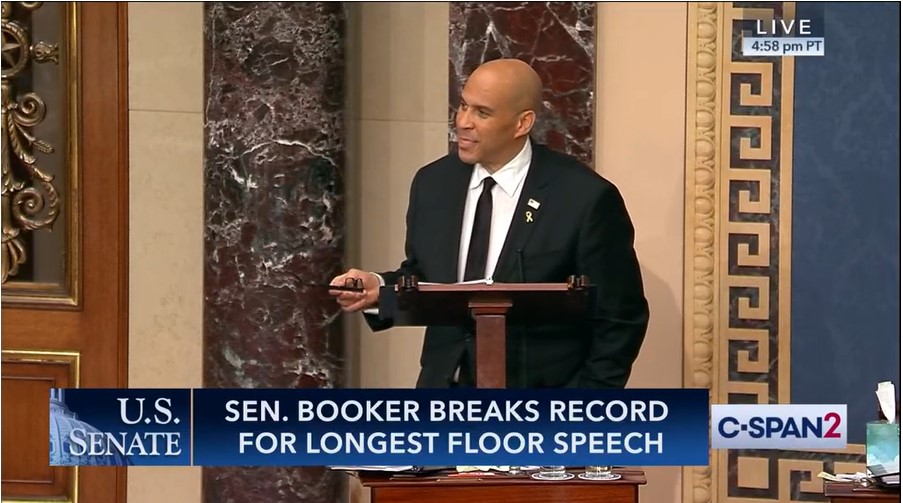
Cory Booker set the record for the longest Senate speech at 25 hours, 4 minutes, surpassing the previous record of 24 hours, 18 minutes set by Strom Thurmond in 1957 against the Civil Rights Act. Protesting against the Trump administration’s policies, including cuts to government agencies and the effects on health care, education, veterans, and national security, Senator Booker began talking at 7:00 p.m. on the evening of Monday, March 31, 2025, and spoke continuously, yielding to fellow senators only briefly to answer questions, until Tuesday evening, April 1, at 8:04 p.m.